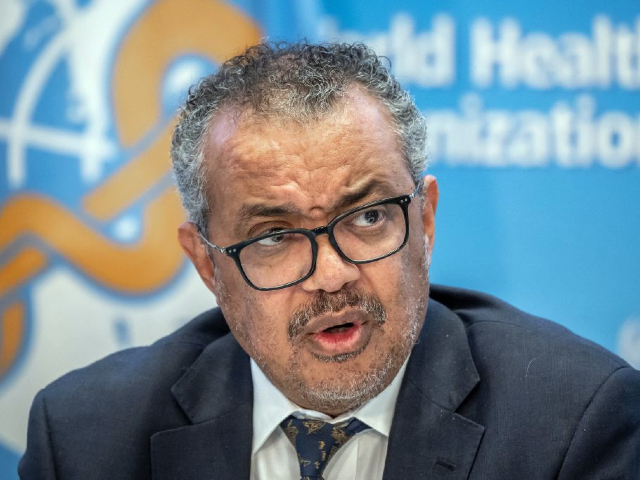
President Joe Biden’s envoy to World Health Organization (W.H.O.) negotiations on the creation of an international agreement on pandemics, Pamela Hamamoto, assured the global body in remarks on Monday that, under Biden, America “is committed to the Pandemic Accord” and hopes it will government such emergencies “for generations to come.”
The “Pandemic Accord” is a draft international legislation meant to streamline the response to any future pandemics, defined as events in which the entire world experiences the rapid spread of disease, jeopardizing health institutions and causing widespread illness and death. The parties working on the draft – member countries of the W.H.O.’s Intergovernmental Negotiating Body (INB) – have not agreed on the contents of the agreement and are currently holding a meeting to discuss the first rough draft that exists, scheduled to take place from Monday through Friday.
The draft is so preliminary that the parties have not yet agreed as to what kind of document it will be and so are calling it, for now, the “W.H.O. convention, agreement or other international instrument on pandemic prevention, preparedness and response,” or “WHO CA+”.
W.H.O. leaders have attempted to establish agreement among its dozens of state parties since at least 2021 on revising international law in the aftermath of the Chinese coronavirus pandemic. Early reports prior to the 2021 World Health Assembly (WHA), the agency’s annual meeting, suggested that W.H.O. leadership hoped to establish a pandemic treaty at that event, but the WHA ultimately only agreed to discuss the potential existence of such a convention.
“The ongoing chaos of this pandemic only underlines why the world needs an ironclad global agreement to set the rules of the game for pandemic preparedness and response,” W.H.O. Director-General Tedros Adhanom Ghebreyesus said at the time. “The world has treaties to manage other threats. Surely countries can agree on the need for a binding pact on the threat of pandemics.”
Hamamoto affirmed during this week’s discussions that the Biden administration supported WHO CA+ in theory prior to listing what she described as multiple faults with the initial draft.
“The United States is committed to the Pandemic Accord, to form a major component of the global health architecture for generations to come,” Hamamoto said, according to a transcript of her statement to the INB on Monday. “Shared commitment, shared aspirations and shared responsibilities will vastly improve our system for preventing, preparing for, and responding to future pandemic emergencies.”
Hamamoto described the Biden administration’s stance as pursuing the establishment of an agreement that “establishes sustainable financing, governance, and accountability to ultimately break the cycle of panic and neglect.”
“However,” she stated, “the draft is unbalanced toward response at the expense of prevention and preparedness.”
Hamamoto described the document as not sufficiently integrating “equity” into its principles and objected to listing “common but differentiated responsibilities and capabilities” as a guiding value.
“This concept is not appropriate in the context of pandemic PPR,” she said. “We look forward to seeking common ground to best ensure universal application while also ensuring capacities are strengthened so that countries can meet their obligations.”

WHO Director-General Tedros Adhanom Ghebreyesus addresses during a press conference at the World Health Organization’s headquarters in Geneva, on December 14, 2022. (Photo by Fabrice COFFRINI / AFP) (Photo by FABRICE COFFRINI/AFP via Getty Images)
The draft WHO CA+ lists a series of responsibilities for countries that ratify it, including a crafted responsibility to waive intellectual property rights for “pandemic-related products,” participation in regular “tabletop exercises” to improve pandemic response, and the incorporation of human rights protections into public health laws, presumably to avoid the widespread atrocities occurring during lockdowns and quarantine camp internment in countries such as China during the current pandemic. The accord would require signatories to cede some amount of international “oversight of and reporting on laboratories and research facilities that carry out work to genetically alter organisms,” a potential nod to growing concerns that the Wuhan coronavirus pandemic was a result of a leak at the Wuhan Institute of Virology, an institution known to be studying bat coronaviruses at the onset of the pandemic.
The draft accord also requires the creation of an oversight body to enforce the accord, a “global compensation mechanism for injuries resulting from pandemic vaccines,” and a “Global Pandemic Supply Chain and Logistics Network” to avoid shortages of necessary goods.
The “common but differentiated responsibilities” provision that Hamamoto objected to requires wealthier nations to take on more responsibilities than poorer countries.
“States that hold more resources relevant to pandemics, including pandemic-related products and manufacturing capacity, should bear, where appropriate, a commensurate degree of differentiated responsibility,” the draft reads, “with regard to global pandemic prevention, preparedness, response and recovery.”
Signatories to the draft provision will have to abide by it for two years before attempting to withdraw; withdrawal will take effect a year from written notification from the country requesting it.
The proposed pandemic accord is a different document than the International Health Regulations (IHR), an already established international legal agreement that multiple state parties, including the United States, have advocated for amending in light of the coronavirus pandemic. The Biden administration proposed a successful amendment last year to the IHR that expanded the W.H.O.’s authority to declare public health emergencies by removing the requirement for the agency to “consult with and attempt to obtain verification from the State Party in whose territory the event is allegedly occurring.” The move appeared to be a response to the W.H.O. taking over a month to declare the coronavirus outbreak in Wuhan, China, a public health emergency in 2020, and regurgitating the Chinese government’s claim at the time that the virus was not transmissible from person to person.
Integrating the amendment into the IHR would take at least two years, Reuters reported last year.





